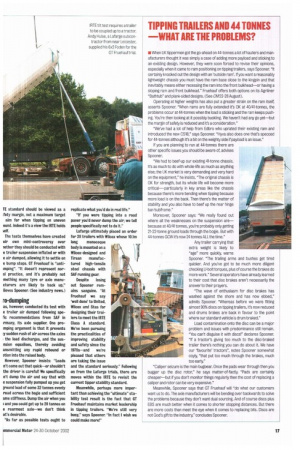TIPPING TRAILERS AND 44 TONNES WHAT ARE THE PROBLEMS?
Page 17

If you've noticed an error in this article please click here to report it so we can fix it.
• When UK tipperrnen got the go-ahead on 44-tonnes a lot of hauliers and manufacturers thought it was simply a case of adding more payload and sticking to an existing design. However, they were soon forced to revise their opinions, especially when it came to ram positioning on tipping trailers, says Spooner. It certainly knocked out the design with an 'outside ram'. If you want a reasonably lightweight chassis you must have the ram base close to the kingpin and that inevitably means either recessing the ram into the front bulkhead—or having a sloping ram and front bulkhead," Fruehauf offers both options on its Agriliner "Bathtub" and plank-sided designs. (See CM22-28 August).
Operating at higher weights has also put a greater strain on the ram itself, asserts Spooner. When rams are fully extended it's OK at 40/41-tonnes, the problems occur at 44-tonnes when the load is sticking and the ram keeps pushing. You're then looking at it possibly buckling. We haven't had any go yet—but the margin of safety is reduced and it's a consideration."
"We've had a lot of help from Edbro who uprated their existing ram and introduced the new CS18," says Spooner. "Hyva also does one that's specceid for 44-tonnes although it's a bit on the weighty side if payload is an issue."
If you are planning to run at 44-tonnes there are other specific issues you should be aware of, advises Spooner.
"We had to beef-up our existing 41-tonne chassis. It's as much to do with whole-life as much as anything else; the UK market is very demanding and very hard on the equipment," he insists. "The original chassis is OK for strength, but its whole life will become more critical--particularly in key areas like the chassis because there's more bending when tipping because more load is on the back. Then there's the matter of stability and you also have to beef up the rear hinge bar/subframe."
Moreover. Spooner says: "We really found out where all the weaknesses on the suspension are— because at 40/41 tonnes, you're probably only getting 21-22-tonne ground loads through the bogie. But with 44-tonnes GCW it's now 24 tonnes ALL the time."
Any trailer carrying that extra weight is likely to "age" more quickly, warns Spooner. The trailing arms and bushes get tired quicker. And you've got to be much more diligent checking U-bolt torques, plus of course the brakes do more work." Several operators have already learned to their cost that disc brakes aren't necessarily the answer to their prayers.
"The wave of enthusiasm for disc brakes has washed against the shore and has now ebbed," admits Spooner. 'Whereas before we were fitting almost 90% discs on tipping trailers, it's now reduced and drums brakes are back in favour to the point where our standard vehicle is drum braked."
Load contamination onto the disc can be a major problem and issues with predominance still remain. "You can't disguise it with discs!" declares Spooner. "If a tractor's giving too much to the disc-braked trailer there's nothing you can do about it. We have our 'favourite' tractors", notes Spooner somewhat coyly, "that put too much through the brakes, much too early."
"Caliper seizure is the main bugbear. Once the pads wear through then you bugger up the disc rotor," he says matter-of-factly. "Pads are certainly cheaper—but if you don't monitor things regularly then the cost of replacing a caliper and rotor can be very expensive."
Meanwhile, Spooner says that GT Fruehauf will "do what our customers want us to do. The axle manufacturers will be bending over backwards to solve the problems because they don't want dual sourcing. And of course discs plus EBS are much better when it comes to shorter stopping distances. But there are more costs than meet the eye when it comes to replacing bits. Discs are not God's gift to the industry," concludes Spooner.
























































































































































